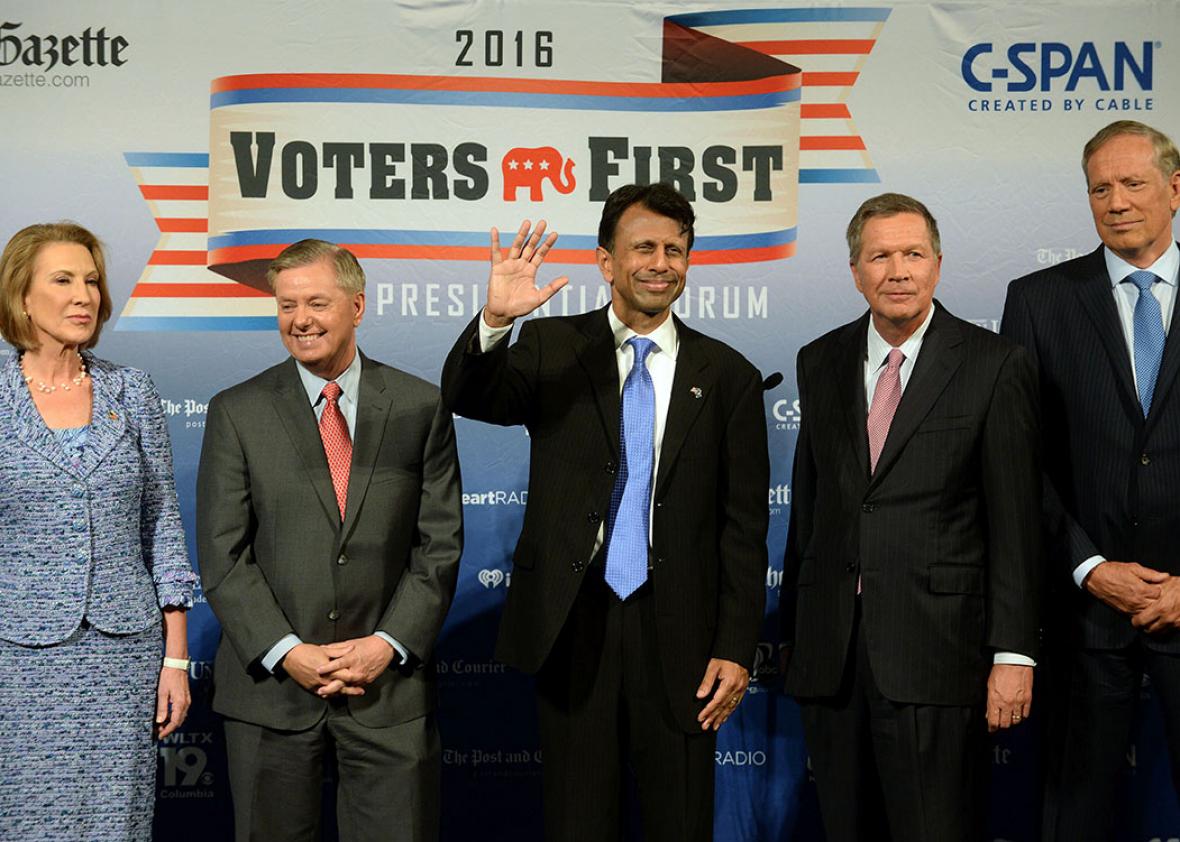GOFFSTOWN, New Hampshire—Fourteen of the Republican candidates running for president participated in a campaign forum in New Hampshire Monday night. It was a fascinating view of an alternate universe where there are no insults, talking points reign over candor, and everyone plays by the slow-moving, old rules of politics. In short, Donald Trump wasn’t there.
It wasn’t just that the forum was a sleepy affair—interrupted only by a few titters from the audience but no spontaneous applause—the somnolent two hours were free from any stirring remarks by the candidates. Rather, it was like a speed-editing contest where candidates listened to the questions and then rushed to find the paragraphs in their stump speeches that conveyed what they wanted voters to hear without making it appear as though they had ducked the underlying question.
That’s the way it normally goes at these things. We scratch our rake across the barren desert of these gatherings for a moment of candor or a flash that gives us some insight into the candidates. We’re pushy. Voters are less so, and for them the event offered some basic introductory information. They got to hear the biography of some candidates—former CEO Carly Fiorina started out as a secretary, and Sen. Ted Cruz’s father fled Cuba—and they heard the boiled-down rationale for each candidate—Gov. Scott Walker fought for conservative policies in a purple state, and Gov. John Kasich balanced budgets while thinking about people on the margins of society.
But this isn’t the speed at which this race is being run right now. Trump is way out in front. In the latest CBS poll, 24 percent of Republican voters support him. Jeb Bush, the closest competitor, is at 13 percent. Walker is at 10 percent. That’s roughly the way things sort in most of the polls.
Trump’s candor is contributing to his poll position. People are so starved for something that sounds authentic that they’ll reward the candidate with the most of it, regardless of the content. In the CBS poll, 79 percent of voters say Trump says what he means. For all the other politicians, that number is about 50 percent. Of the questions asked in the poll, that is the only area where Trump holds that kind of dominant lead over his opponents.
This is what made Monday night’s forum seem so antiquated. There was very little candor to be found, though to be fair, candidates weren’t given much opportunity. There were so many of them, they had to be shuttled onstage and offstage for questioning that lasted no longer than the duration of a full-service stop at the filling station. While someone was being questioned, all the other candidates sat in the first row with attentive gazes, aware that they would be caught in cutaway shots on C-SPAN.
The public’s love of candor explains why Trump is doing well with groups who you would expect to balk at him. He leads among Republican primary voters on both sides of the immigration debate, though he’s been criticized for his comments about Mexican immigrants and supports deporting all undocumented workers. He leads with conservatives, though he has supported single-payer health care and has given financial donations to Democrats. He leads with evangelical voters, though he was pro-choice, has been married three times, and said he has never asked God for forgiveness. Even among non–Tea Party voters, Trump is only trailing Bush by a little.
Trump’s candidacy still has serious flaws in the long term. Like in other polls, the CBS poll shows that Republicans like him and continue to like him, but the larger pool of voters do not. Republicans say the more they hear from Trump, the more their opinion of him improved (23 percent) than has gotten worse (12 percent). The exact reverse is true, however, among registered voters, a larger pool that more closely approximates the general electorate. Those general election voters are likely to say that their views of Trump have worsened the more they’ve heard from him. Among registered voters, 59 percent have an unfavorable opinion of Trump. That’s the highest of any human seeking the presidency at the moment.
What are the non-Trump candidates going to do about their candor problem? When candidates get hot, their competitors try to copy them. In 2008, Democrats all started to talk about the poor when John Edwards’ poverty policies gained traction. When Herman Cain’s 9-9-9 tax plan became popular, all his GOP rivals had to come up with one. But that’s much harder to do when the candidate is gaining traction because of the way he behaves. Are the other candidates going to start saying things that make voters think they’re being candid? That’s dangerous and hard to do because it is a posture with which they are unfamiliar. Plus, no one is going to out-Trump Trump. The polls show that the second choice for Trump voters scatters across the other top-tier candidates. There is no heir apparent who scratches that same itch, though Govs. Kasich and Chris Christie come closest on the candor scale. So, in order to advance, perhaps candidates are going to have to hope that the race returns to the one that they took part in Monday night, a race in which Donald Trump is nowhere to be found.
